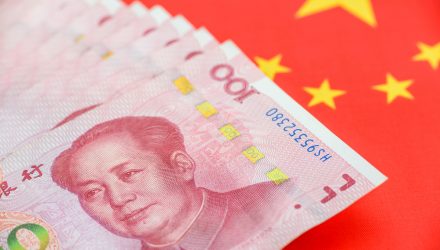China country-specific exchange traded funds reeled Monday after updated economic data revealed a sharp slowdown in growth.
On Monday, the Xtrackers CSI 300 China A-Shares ETF (ASHR) fell 0.4% and the KraneShares Bosera MSCI China A Share ETF (KBA) dropped 0.4%. Meanwhile, among the China ETFs that don’t track the China A-shares market or Chinese companies listed in overseas exchanges, the SPDR S&P China ETF (NYSEArca: GXC) declined 1.9% and the iShares China Large-Cap ETF (NYSEArca: FXI) decreased 1.7%.
Chinese factor output and retail sales growth declined and missed their marks over July as new Covid-19 cases and heavy flooding disrupted the economy and weighed on the emerging market’s outlook, Reuters reports.
Specifically, industrial production in the world’s second largest economy only rose 6.4% in July year-on-year, according to the National Bureau of Statistics (NBS). Analysts had been projecting output to increase by 7.8% after expanding 8.3% in June.
Additionally, retail sales gained 8.5% in July year-over-year, but came in far lower than expectations of a 11.5% rise and June’s 12.1% gains.
While China’s economy rebounded back to its pre-pandemic growth levels far more quickly than other global economies, the expansion in the country is seen to be losing momentum as businesses try to tackle higher costs and supply bottlenecks. Furthermore, the more infectious COVID-19 delta variants added to new restrictions in July as Beijing implemented new restrictions on the spread of the coronavirus, disrupting the country’s factory output, which was already weighed down by severe summer floods.
Looking ahead, Nomura analysts warn that consumption, industrial production, and investment could further slow in August as a result of restrictions in response to new Covid-19 infections, along with tightening measures in the property sector and high-polluting industries.
“Given China’s ‘zero tolerance’ approach to Covid, future outbreaks will continue to pose significant risk to the outlook, even though around 60% of the population is now vaccinated,” Louis Kuijs, head of Asia economics at Oxford Economics, said in a note.
For more news, information, and strategy, visit the China Insights Channel.

